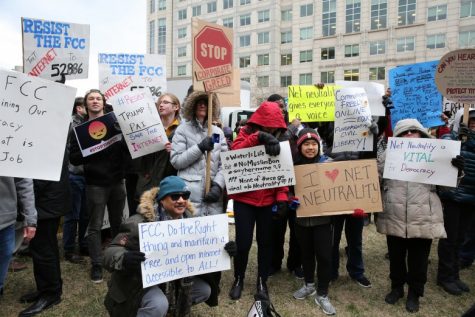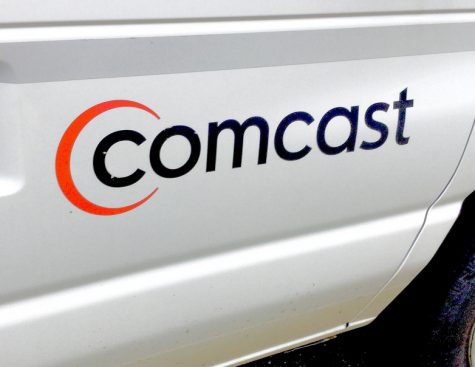The Net Neutrality Repeal: What Happens Now?
December 22, 2017
The Federal Communications Commission (FCC) board voted 3-2 to repeal the Title II net neutrality rules on Dec 14.
However, not all of the FCC commissioners supported the repeal.
During the voting session, Democratic FCC Commissioner Mignon Clyburn expressed her opposition to the repeal.
“I dissent, because I am among the millions outraged,” said Mignon Clyburn, according to Cecilia Kang’s New York Times article. “Outraged, because the F.C.C. pulls its own teeth, abdicating responsibility to protect the nation’s broadband consumers.”
After the decision was finally made, it was met with resistance from states, organizations, companies, and individual people.
The attorney generals of Oregon, California, District of Columbia, Hawaii, Illinois, Iowa, Massachusetts, Kentucky, Maine, Maryland, Mississippi, North Carolina, Pennsylvania, Rhode Island, Vermont, Virginia, and Washington signed a letter directed to the FCC stating they plan to challenge the repeal.
“It is essential that the Commission gets a full and accurate picture of how changes to net neutrality will affect the everyday lives of Americans before they can act on such sweeping policy changes,” stated the letter.
The decision to challenge the repeal came after New York Attorney General, Eric Schneiderman found 2 million comments on the FCC website that used fake names, used the names of dead people or were made by hackers.
Washington state also plans on suing the FCC because in addition to repealing net neutrality, Pai included in the new law that individual states and other federal agencies are prohibited from creating new net neutrality rules.
The National Hispanic Media Coalition (NHMC) is seeking judicial review of the repeal in order to ensure that internet service providers (ISPs) will not discriminate against marginalized communities.
“Chairman Pai’s repeal of Net Neutrality rules is a frontal attack on Latinos and other communities of color, who already face substantial barriers in getting online, staying online, and having high quality Internet,” stated Vice President of the NHMC, Carmen Scurato, on their website.
The nonprofit organization Free Press plans to also legally challenge the FCC and encourages people who support net neutrality to protest.

“We intend to sue the agency on the basis of its broken process, deeply flawed legal reasoning, willful rejection of evidence, and absolute disregard for massive public input,” said Collette Watson in a blog post uploaded to the Free Press website.
The Internet Association which represents big net companies such as Google and Facebook said it was considering legal action.
Companies who run their business through the internet such as Facebook, Amazon, Microsoft, Reddit, Kickstarter, and Google have shown their support for net neutrality and their reaction to the repeal.
“We’re disappointed in the decision to gut #NetNeutrality protections that ushered in an unprecedented era of innovation, creativity & civic engagement,” tweeted Netflix on their official twitter account.
Pai released a video on conservative media site The Daily Caller that tries to show people what they can still do on the internet when net neutrality is repealed.

In response to the video which featured Pai wielding a lightsaber from the franchise Star Wars and doing the harlem shake, celebrity Mark Hamill most known for portraying the character Luke Skywalker in the Star Wars movies posted his reaction on Twitter.
“Cute video Ajit “Aren’t I Precious?” Pai…-but you are profoundly unworthy [to] wield a lightsaber,” tweeted Mark Hamill. “A Jedi acts selflessly for the common man-NOT lie [to] enrich giant corporations.”
But the internet is not going to drastically change overnight.
It will take a few weeks for the repeal to go into effect because it must be reviewed by the Office of Management and Budget.
ISPs Comcast and AT&T promised consumer internet experience will not change, but the FCC will no longer be monitoring their behavior.

Instead, the Federal Trade Commission (FTC) will oversee their behavior; however, the FTC lacks the power the FCC has.
In addition, there is still the potential for paid prioritization because there is not enough competition in the internet service industry.
Overtime, consumers may notice certain websites will be slower, and they may need to pay more for certain services.
Larger internet companies will be favored over upstarts.
For example, Amazon and eBay may be placed on the fast lane while small shops like Etsy will run on the slow lane.
Due to the slower speed, people are more likely to exit out of the website causing the upstart to lose business.
Democratic FCC Commissioner Jessica Rosenworcel outlines the consequences of the repeal.
“As a result of today’s misguided action, our broadband providers will get extraordinary new powers. They will have the power to block websites, the power to throttle services, and the power to censor online content,” said Democratic FCC Commissioner Jessica Rosenworcel, according to Margaret Harding McGill’s Politico article. “They will have the right to discriminate and favor the internet traffic of those companies with whom they have pay-for-play arrangements and the right to consign all others to a slow and bumpy road.”




